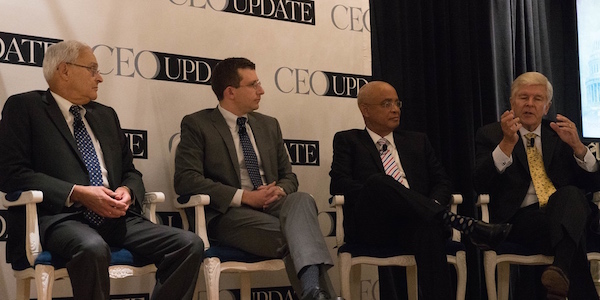CEO Update Live: More use of peer data driving upward pay trend
CEO Update Live: More use of peer data driving upward pay trend
- October 6, 2016 |
-
 WILLIAM EHART
WILLIAM EHART

Expert panelists say strong compensation growth driven by factors like benchmarking, staff raises and desire to retain top talent
 CEO Update Live: Compensation panelists, from left, Art Herold, Simon Quint, Jim Moss and Leonard Pfeiffer. |
Ongoing healthy increases in association CEO compensation are driven by the uptrend in staff salaries, greater availability of salary benchmarking and the need to retain top talent.
That was the message from an expert panel at the CEO Update Live: Compensation forum held Oct. 6 at the Loews Madison Hotel in Washington, D.C.
CEO Update Managing Director Mark Graham noted that the publication's latest compensation study showed median chief executive compensation rising at a 4 percent clip.
"From our survey analysis, when you look at CEO pay increases, they are typically higher than what the rank and file gets, and that has been about 3 percent for many years," said Jim Moss, managing director and founder of PRM Consulting.
"So it's not surprising that 4 percent would be (the median CEO pay increase), he said.
Other panelists were Art Herold, partner in law firm Webster, Chamberlain & Bean, Leonard Pfeiffer, founder of executive recruiting firm Leonard Pfeiffer & Company and Simon Quint, principal with compensation consulting firm Quatt Associates.
Quint said CEOs have more information about their peers' compensation than ever before.
"We're seeing a more level playing field," he said. "In the past, the board had all the information, but CEOs have a lot of information now. You really can't get away with paying less than the marketplace, and the CEO marketplace is moving rapidly, so compensation just keeps ratcheting up slowly."
Pfeiffer said there is no "cookie cutter" solution—compensation increases depend on the type of group.
"If the organization has a major lobbying or regulatory issue, they're going to be much more aggressive about CEO pay raises," he said. "If an organization is having major financial problems or there's nothing really happening in the industry, you're going to be on the other side of the median. Instead of 4 percent, you're going to be at 2 percent."
Graham asked Herold if boards were pushing back against the rate of CEO compensation increases.
Herold said board members' experience with their own compensation may sometimes place a limit on CEO salary, but that there are other ways to reward the chief executive.
"I've heard board members say, ‘I'm not getting 4 percent myself, why should I pay the executive 4 percent more?' That might be one brake on increases.
"Obviously, there are alternatives to salary increases. There may be ways the executive can get other benefits, such as bonuses for performance and increased deferred compensation," Herold said.
